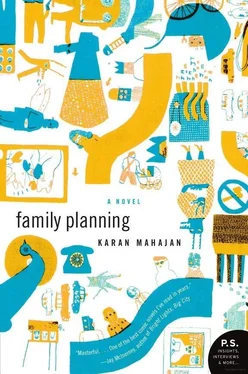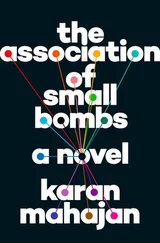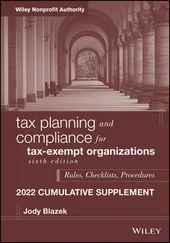But now the giant cross of the chapel loomed over him. He suddenly wished he hadn’t lied to her about the rock band. But it had seemed like a good idea at the time. And, he supposed, it was the one thing his spying parents and siblings didn’t know about him.
He was a rock star.
CHAPTER 2. MR. AHUJA’S RATHER UNMANAGEABLE SECRET
ARJUN WAS LOATH TO ADMIT IT, but he had his father to thank for the extended flirtation. The construction of flyovers had landmarked the city with pillars of rubble and rusty MEN AT WORK signs and mesmerizing shivers of arrow-sharp steel pointing skyward; a bus ride of eight minutes now took a wondrous fifteen. But Delhi believed itself to be crawling out of a chrysalis. The Super Prime Minister had declared a genocidal war on traffic lights. The opening of flyovers was second only in excitement to India-Pakistan cricket matches. Commuters bravely accepted the temporary congestion and looming phallic shadows as collateral for development.
Only Mr. Ahuja and a handful of his juniors at the Ministry of Urban Development knew they were wrong.
Delhi, quite simply, was fucked.
Mr. Ahuja rapped the teak table in the study with his knuckles. The beautifully detailed paper model of the Flyover Fast-Track, New Delhi, Circa 2018 vibrated, and a few dinky cars crashed off the model flyovers onto the cardboard pavements below.
The room sounded hollow. Mr. Ahuja felt unbearably lonely in his study. The mechanics of the whole thing were vaguely amusing: no matter how deaf you were, you could hear the dull plunk of hollowness. His awkward “encounter” with Arjun in the nursery last night and then at the bus stop in the morning had left his stomach feeling raw. All through his walk back home, he’d wished he could talk to the boy. The loneliness only compounded his problems because his first impulse when he felt at all uneasy was to plunge himself into the midst of a crowd, to feel the flitting glances cleanse him like the random water-jets of a sprinkler, and right now there was no crowd to speak of, only the giant expanse of the study, the pinnacle of his career hardening before him in teak wall panels and carpeted floors — empty. He hated emptiness. He hated it here in his study and he hated it in his office. He was never happier than when he was at the helm of his colossal domestic factory — loading the children into his Toyota Qualis and driving them to India Gate for a midnight ice cream, watching twenty-odd eyes affix to the prized fruit hanging on a tree in an orchard, feeling the hot cluster of their bodies behind his back like a small army — all to the dismay of his bodyguards who were supposed to shelter him from crowds. His two bodyguards had no work. They had stopped accompanying him to the office in his second year. Now he grieved for their absence. He grieved that he had given them up — that assiduous pair of Balwant Singh and Ram Lal — to a shabby domesticity, that he had let them become maids in the house, washing and drying the truckloads of dirty clothes the children shed daily with the alacrity of porno stars. Sometimes you could see the two men sitting beside a large slab of marble at the back of the house, on their haunches, smoking bidis, flogging pairs of wet jeans against the rock, and the sight would arouse sympathy in Mr. Ahuja. At these moments, he would feel the temptation to embezzle ministerial funds for a washing machine — a temptation that flared upward from his groin and culminated in a facial grimace, but no, he never gave in. He knew this: Mrs. Ahuja was obsessed with washing. If he ever bought a machine, she would end up staring at its window all day, hypnotized by the knots of clothes unfurling under curtains of detergent.
Wasn’t it like that with TV already?
At least the TV was in the nursery where she could also watch over the children.
Mr. Ahuja needed to change channels. He lay back in his chair, hunched forward, and coughed violently into his red silk tie. The act was comforting: the silk tie was the only object of clothing that escaped Mrs. Ahuja’s washing and therefore defined him, breeding and sustaining a microcosm of smells and germs and saliva (he often fell asleep in his office in the weeks after a difficult campaign) that he’d encountered over his long and varied career as a politician. The tie featured a repeated pattern of cricketers playing straight drives. He coughed again into the cricketer closest to himself, rolling up the tie as if to dam in the germs. He loved the tie; it drew him from his introspection, he could smell it and be whisked to a better time. The tie was his most loyal companion, his pendulous sycophant, his brief reprieve from the lazy, flowing kurta-pajamas that he’d started wearing ever since he became a politician. But he loved the tie mainly because it was a birthday present from his first wife, Rashmi. Rashmi: Arjun’s mother, dead. No one ever spoke of Rashmi in his household, and how could they?
Arjun didn’t even know he was Rashmi’s son. None of the other children did either. Mr. Ahuja had done his best to keep this fact a secret.
Yet, today, when Arjun had taunted him at the bus stop, when Arjun had cheekily asked Why do you and Mama keep having babies? he’d wished to say Are you aware that you didn’t even walk in on your real mother last night ?
Luckily, he’d had the foresight to use Muslims as scapegoats.
In this he had become like all his colleagues in the party.
Now he simply felt dejected. Mr. Ahuja stood up and paced. His ratty Bata shoes plowed a soft ravine through the powdery blue carpet. He pressed the buzzer lying on the table with his pinky (his preferred weapon of choice for reprimanding and demanding) and walked over to the window. He saw his own reflection in the tinted glass and tried to ignore the sights of Delhi that lay beyond his watery visage. His face was a succession of comforting curves; not a handsome face, but one that could appear perpetually interested, the brows raised on a pivot of white hair above his nose, the cheeks retracting into an intelligent angularity when he spoke, the eyes small and intense, yet not beady. Here was a man who could appear dire in his earnestness, a forty-three-year-old with a paunch whose face was still gaunt and young with stubble. He withdrew a little from the glass, holding his gaze. It had always amused him as a boy, that if you brought your face closer and closer to a glass, you would stop seeing your own reflection; eventually you’d be so close to your ghost in the polished surface that you could look through its eyes. And because you shared eyes, you couldn’t see it. You could only see the city spread out ahead of you, a palimpsest for the cities to come, a teeming, fertile ground where one could sow concrete and watch it sprout into strange, often hideous shapes.
And what did one see when one was close to someone else’s face, making love? What did one see beyond?
Mr. Ahuja knew: it depended completely on who you were making love to. With Rashmi he had seen nothing beyond — just a blackness, a black cricket field full of black cricketers, the four towering stadium lights blessing every cricketer with not one, not two, but four shadows; each cricketer appearing, from a height, like a tiny wad of flesh affixed to the center of a shadowy quadrupronged compass, and then he and she would be standing high above the field and the lights would go off one by one and then they were alone, circling above the pitch black, together. The cricketers would disappear. The compasses would disappear. There’d be nowhere else he’d rather be.
And with Sangita — perpetually pregnant, constantly fertile Sangita?
Sangita with her still-peculiar odor of mothballs and Tiger Balm? With her body oiled from the constant attentions of the massage-wali? With her thick left hand always pressed against the small of her back? Her old-person groans? Her almond-milk breath? Her chin acne? Her belly button upturned proudly? Her stomach fabulous and fragile, all at once?
Читать дальше












